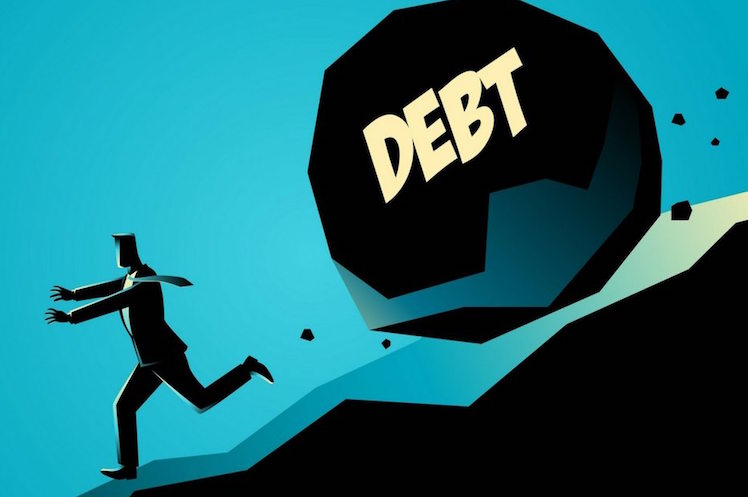By Emmanuel Yashim
Debt is part of human life and existence. Debt is also as old as man and so are defaulters.
According to the International Monetary Fund (IMF) database, there is only one country in the world that is debt-free. That country is Macau Special Administrative Region of greater China.
- NIGERIA DAILY: No Road To The North As Terrorists Run Berserk In Kaduna
- Tension at Nigerian border communities after Cameroon’s encroachment
Seven of the world’s big economies rank among the 20 countries with the highest external debts. These are the United States (28.9 trillion dollars), Russia (280.1 billion dollars), United Kingdom (2 trillion pounds), France (3 trillion dollars), Germany (5.9 trillion euros), Japan (12.2 trillion dollars) and China (7 trillion dollars).
African countries are not left out. Many of them are collecting loans from the World Bank, the IMF, China and other countries of the world to fund various development projects, but the trend has become a source of great concern among analysts.
The concern among the analysts is borne out of the increasing indebtedness of many countries in the continent.
According to the Economic Times, Africa’s debt to China exceeded 140 billion dollars as at September 2021.
Meanwhile, the IMF estimates that additional financing of up to 285 billion dollars would be needed from 2021 to 2025 by African countries to step up their spending response to the coronavirus pandemic.
Over the past two decades, China has become a major global lender, with outstanding claims now exceeding more than five per cent of global Gross Domestic Product (GDP).
In total, the Chinese state and its subsidiaries have lent about 1.5 trillion dollars in direct loans and trade credits to more than 150 countries around the world.
This has turned China into the world’s largest official creditor – surpassing traditional, official lenders such as the World Bank, the International Monetary Fund (IMF), or all creditor governments of the Organisation for Economic Cooperation and Development (OECD) combined.
According to the IMF, more than 20 low-income African countries are in debt distress or at risk of debt distress between September and December 2021.
The debt of low- and middle-income countries in sub-Saharan Africa increased to a record 702 billion dollars in 2020, according to a new World Bank report released on Oct. 11, 2021. This is the region’s highest debt in a decade.
In 2010, sub-Saharan Africa’s debt stood at around 305 billion dollars.
China currently is a leading bilateral lender in 32 African countries and the top lender to the continent as a whole.
In 2020, the African countries with the largest Chinese debt were Angola (25 billion dollars), Ethiopia (13.5 billion dollars), Zambia (7.4 billion dollars), the Republic of the Congo (7.3 billion dollars) and Sudan (6.4 billion dollars).
But the debts have been triggering a repayment crisis. China owns around 72 per cent of Kenya’s external debt which stands at 50 billion dollars.
Over the next few years, Kenya is expected to pay 60 billion dollars to the China Exim Bank alone, sources informed.
Mombasa port could be lost if Kenya defaults on the loan re-payment, according to Kenya’s own auditor general.
The National Treasury Cabinet Secretary Ukur Yatani, denied that Kenya had offered the strategic national asset as collateral for the 3.2-billion-dollar loan sourced from the Export-Import Bank of China (Exim China) to finance its Standard Gauge Railway (SGR) project.
The Ugandan government also had to postpone the construction of the ‘Kampala-Entebbe expressway after the political opposition raised concerns over the country’s rising debt profile.
In Djibouti, China has provided nearly 1.4 billion dollars which is 75 per cent of the country’s GDP, according to reports.
Between 2010 and 2015, Nigeria’s debt to China grew by 136 per cent from 1.4 billion to 3.3 billion dollars and the country had to spend 195 million dollars in 2020 as debt repayment to China.
Meanwhile, Credit rating agency, Agusto&Co, in its Economic Newsletter January 2022 edition said that Nigeria’s foreign debt could rise from about N15 trillion to N18 trillion if the Central Bank of Nigeria (CBN) devalued the naira at about 20 per cent.
The firm added that Nigeria has assumed a hawkish foreign exchange policy stance since 2015 and this has been elevated from 2020 to date.
Again, Nigeria has to repay 400 million dollars on a loan provided by China for the ‘Nigerian National Information and Communications Technology Infrastructure Phase – II Project,’ signed in 2018.
Former Chairman of the Senate Committee on Foreign and Local Loans, Sen. Shehu Sani said loans were indispensable in the 21st century economic development but “we should only borrow when it is necessary.
“It is impossible to say you want to develop your country without borrowing, but as a developing country, there is a need to prioritise borrowing,’’ he said.
Meanwhile, DMO’s Director-General, Mrs Patience Oniha has faulted the IMF report and a similar one by foremost Pan-African Credit Rating Agency, Agusto & Co.
She said that both reports failed to consider the challenges experienced by Nigeria in recent times.
“There were challenges such as two recessions, sharp drop in revenues and security challenges.
“Even more, the analyses do not acknowledge the improvements in infrastructure which have been achieved through borrowing, as well as, the strong measures by the government to boost revenues,” she said.
The DMO clarified that Nigeria’s loans from China stood at 3.59 billion dollars (or 9.4 per cent) of the country’s total foreign debt stock.
It also clarified that the loans were largely concessional, as no national asset was tagged as collateral.
“Before any foreign loan is contracted, including the issuance of Eurobond, they are approved by the Federal Executive Council and thereafter, the National Assembly.
Meanwhile, China’s Foreign Minister Wang Yi has rejected allegations that Beijing was luring African countries into debt traps by offering them massive loans, dismissing the idea as a “narrative” pushed by opponents of poverty reduction.
Wang, who spoke ahead of a tour of Beijing-funded projects in Kenya in January, said China’s considerable lending to Africa was “mutually benefiting” and not a strategy to extract diplomatic and commercial concessions.
“That is simply not a fact. It is speculation being played out by some with ulterior motives,” he told reporters in the Kenyan port city of Mombasa.
Available records showed that at least 18 African countries have been re-negotiating their debts, while 12 others are in talks with China for restricting an approximate 28-billion-dollar loans.
(NANFeatures)

 Join Daily Trust WhatsApp Community For Quick Access To News and Happenings Around You.
Join Daily Trust WhatsApp Community For Quick Access To News and Happenings Around You.


